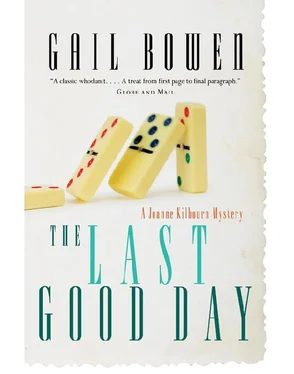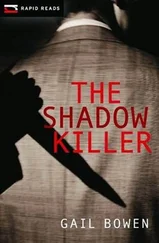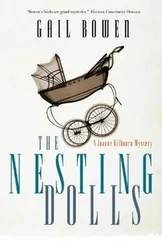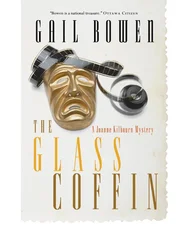Gail Bowen - The Last Good Day
Здесь есть возможность читать онлайн «Gail Bowen - The Last Good Day» весь текст электронной книги совершенно бесплатно (целиком полную версию без сокращений). В некоторых случаях можно слушать аудио, скачать через торрент в формате fb2 и присутствует краткое содержание. Жанр: Классический детектив, на английском языке. Описание произведения, (предисловие) а так же отзывы посетителей доступны на портале библиотеки ЛибКат.
- Название:The Last Good Day
- Автор:
- Жанр:
- Год:неизвестен
- ISBN:нет данных
- Рейтинг книги:4 / 5. Голосов: 1
-
Избранное:Добавить в избранное
- Отзывы:
-
Ваша оценка:
- 80
- 1
- 2
- 3
- 4
- 5
The Last Good Day: краткое содержание, описание и аннотация
Предлагаем к чтению аннотацию, описание, краткое содержание или предисловие (зависит от того, что написал сам автор книги «The Last Good Day»). Если вы не нашли необходимую информацию о книге — напишите в комментариях, мы постараемся отыскать её.
The Last Good Day — читать онлайн бесплатно полную книгу (весь текст) целиком
Ниже представлен текст книги, разбитый по страницам. Система сохранения места последней прочитанной страницы, позволяет с удобством читать онлайн бесплатно книгу «The Last Good Day», без необходимости каждый раз заново искать на чём Вы остановились. Поставьте закладку, и сможете в любой момент перейти на страницу, на которой закончили чтение.
Интервал:
Закладка:
Thirty-seven years later, the soft pages of the Valley Gazette were still heavy with the tragedy of the event and the dark spoor of anger and recriminations that followed in its wake. The text of the stories was heartbreaking, but it was the anguish in the yellowed photographs of two people that stayed with me. The first pictures were of the woman at the centre of the tragedy. Gloria Ryder’s face was stamped with the ancient misery of women whose lives have been devastated by forces beyond their control. It was also – unmistakably – the face of the woman whose likeness had been carved into the figure at the base of the gazebo. The second pictures were of Lily as a child. The photographer had caught her several times on the windswept, frozen playground of the residential school in Lebret. She looked dazed and frail, but she was never alone. A tall boy of perhaps twelve was always with her, his arm raised impotently as he tried to shield Lily from the camera’s invasive eye. The boy was Alex Kequahtooway.
I took the file containing the stories to the counter and rang the bell. The young man in the John Lennon glasses appeared quickly.
“Hard to believe something like that could happen in a place like this, isn’t it?” he said.
“Hard to believe it could happen anywhere,” I said.
As I drove back to Lawyers’ Bay, ideas swirled through my mind like the shifting shapes in a kaleidoscope. The question of whether Alex was Lily’s lover was still unanswered, but there was no doubt that he had been her protector. When he stood at the window of the Hynd cottage and said, “Maybe we all would have been better off just staying where we were,” his bitterness had not been directed at me. It had welled up from a source I never knew existed.
It seemed that the connection between Alex and Lily Ryder had never been severed. But if that was true, there were more questions. Why had Alex never told me about Lily? If she were simply a girl he had once known, why had he never mentioned her name and her tragedy? Other questions nagged. During the years when I believed Alex and I were as close as a man and a woman could be, what other secrets had he held back? What else hadn’t he told me?
It was almost eleven when I pulled onto the shoulder of the road beside the Point Store and walked to the entrance. Angus was outside watering flats of annuals that had seen better days and were now being offered at seriously reduced prices.
“What’s going on?” Angus said. “After you left, Mr. Gardiner came into the store and told me the moment you came I was supposed to tell you he was waiting. Then he went upstairs.” Angus frowned. “I haven’t screwed up, have I?”
I leaned over and picked a faded bloom from a wilting impatiens. “You’re in the clear,” I said. “This has nothing to do with you.”
I could hear the strains of an accordion playing “White Christmas” as soon as I reached the landing at the top of the stairs. I tapped at the door and Stan greeted me. He was wearing a cardigan and slippers, master of his household. He motioned me inside. The living room was furnished with the essentials: a La-Z-Boy, a coffee table, a VCR, and a TV set on which Lawrence Welk was presenting his Christmas special. Stan turned the sound down but not off, walked into the next room, and returned with a chrome kitchen chair.
“Make yourself comfortable,” he said, pointing to the La-Z-Boy.
I sank in, and Stan perched.
“So you read the articles?” he said.
“Yes,” I said. “It was a terrible thing – for everyone.”
“For her especially,” Stan said.
“Lily?”
“I was thinking of the mother.”
“What happened to her? The paper didn’t say.”
“She died of grief and guilt,” Stan said tightly.
Stan was a man who meted out his words sparingly, but I knew he had more to offer. I fixed my gaze on Lawrence Welk. He was thanking his band. A quartet of young women in Victorian Christmas dress appeared on screen. They were fresh-faced and unmistakably related. I grappled for their name and, amazingly, came up with it: the Lennon Sisters. In voices that were sweet and true, they began to sing “Silent Night.”
“She blamed herself,” Stan said. “To this day I don’t know why, but it was a terrible thing to witness. Are you familiar with the Catholic church down there at Lebret?”
“Yes,” I said.
“Then you’ve seen those crosses on the hill behind the church.”
“The Stations of the Cross.”
“So you’re Catholic.”
“Anglican.”
“But you know what those crosses are for.”
“They represent things that happened during Christ’s passion and crucifixion. Some people use the Stations of the Cross to help them pray and meditate on their sins.”
“That’s what Gloria did,” Stan said. “You’ve seen how steep that hill is. Even in good weather it’s a tough climb, and the tragedy happened in January. It was a bitter winter and that hill was sheer ice. Gloria went up that hill every day on her hands and knees. She stopped at every one of those crosses to pray. She blamed herself.”
The image of suffering was as vivid as an illustration in a saint’s tale.
“How long did she live afterwards?” I asked.
“A year to the day. She died on that hill. Of exposure, they said – and I guess you could take that in a lot of ways. When she died, some people said that she’d finally gotten God’s attention and that He gave her what she prayed for.” His gaze was piercing. “Do you believe in that kind of God?” he asked.
“No,” I said. “I don’t.”
“Neither do I,” he said. “Of course, I’m United Church.”
I arrived home to the news that Lily still hadn’t shown up, so the trip to Standing Buffalo was on. Gracie was uncharacteristically quiet on the way to the reserve. Her mood didn’t alter until we came to Betty’s house and saw Betty herself sitting on her porch, snapping beans. At that moment, Gracie became Gracie again, heedless of everything except her goal as she leaped out of the car and ran to Betty. At Rose’s direction, we loaded up the Tupperware containers of food she’d brought for lunch and headed for the house and a living room as fussily pretty as a midway doll. Under Rose’s watchful eye, the girls began to set the table with the good dishes, but when I offered to help, she waved me off.
“Why don’t you keep Betty company?” Rose said. “She’s a talker, which means she can always use a listener.”
It was an easy chore. I liked Betty. The family resemblance to Rose was marked but, in every way, they were very different women. Rose was wiry. She kept her grey hair in a tight, no-nonsense, wash-and-wear perm and limited her skin care to sunscreen. Betty was curvaceous. She was pushing seventy, but her long hair was still black and lustrous and her makeup was cover-girl perfect.
I pulled up a rocker and sat beside her. “So how are you doing?” I said.
“Fine. Except I’m mad at myself.”
“Rose said you fell down your porch steps.”
“And it was my own fault. Last time I was in the city, I went to Payless and bought myself a pair of backless shoes with stiletto heels. I knew it was foolish, but the shoes were on sale and they made my ankles look slim as a girl’s. You know how it is – I just had to have them. Whoever said ‘Pride goeth before a fall’ knew what he was talking about. I was proud, and boy, did I fall.”
“When do you get your cast off?”
“Not for five more weeks. Mind you, I’m not complaining. I’m still on the green side of the grass, and I’ve got Rose and I’ve got Gracie. Do you know that girl offered to come over here and stay with me for the summer if I needed her? She would have done it too.”
Читать дальшеИнтервал:
Закладка:
Похожие книги на «The Last Good Day»
Представляем Вашему вниманию похожие книги на «The Last Good Day» списком для выбора. Мы отобрали схожую по названию и смыслу литературу в надежде предоставить читателям больше вариантов отыскать новые, интересные, ещё непрочитанные произведения.
Обсуждение, отзывы о книге «The Last Good Day» и просто собственные мнения читателей. Оставьте ваши комментарии, напишите, что Вы думаете о произведении, его смысле или главных героях. Укажите что конкретно понравилось, а что нет, и почему Вы так считаете.












